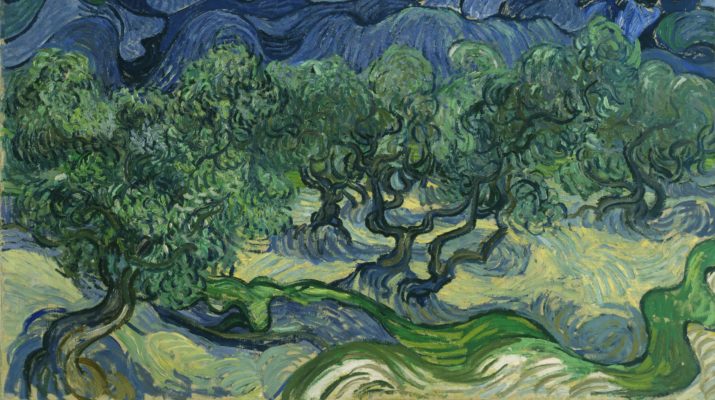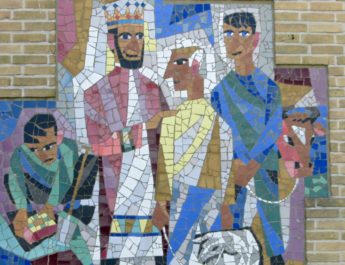Psalm 52
To the leader.A A MaskilB of David,C when DoegD the EdomiteE
A “leader” = natsach. Properly, something that glitters from a distance. So, something that stands out, excels, has status/standing (such as a chief musician or superintendent of Temple services). This can also mean to be permanent or enduring.
B “Maskil” = maskil. 13x in OT. From sakal (to consider or be prudent; to instruct, be an expert; dealing prudently, which implies success and prospering; can mean laying cross-wise). This is maskil or maschil. It is a poem used for instruction.
C “David” = David. From the same as dod (beloved, love, uncle); the root may mean to boil, which is used figuratively to describe love. So, this implies someone you love such as a friend, a lover, or a close family member like an uncle. David’s name likely means something like “beloved one.”
D “Doeg” = Doeg. 6x in OT. From daag (to fear, be worried, sorrow, be concerned, be anxious, be sorry). This is Doeg, “anxious.”
E “Edomite” = Adomi. 11x in OT. From Edom (Edom or Idumaea); from adom (to be red or flushed). This is Edomite, meaning “red.”
came to SaulF and saidG to him, “David has come to the houseH of Ahimelech.”I
F “Saul” = Shaul. From shaal (to ask, inquire, beg, borrow, desire, request; can also mean demand). This is Saul or Shaul, meaning “asked of the Lord.”
G “said” = nagad. This is to declare, make conspicuous, stand in front, manifest, predict, explain.
H “house” = bayit. Probably from banah (to build, make, set up, obtain children; to build literally or figuratively). This is house, court, family, palace, temple.
I “Ahimelech” = Achimelek. 17x in OT. From ach (brother, kindred, another, other, like) + melek (king, royal). This is Ahimelech, meaning “brother of a king.” It is a name used by Israelites and Hittites.
1 Why do you boast,J O mighty one,K
of mischiefL done against the godly?M
All day long 2 you are plottingN destruction.O
J “boast” = halal. This is to be clear – it originally referred to a sound, then a color. It was to shine and then make a show or boast then to rave. In a causative sense it came to mean celebrate, give glory, sing praise, or be worth of praise. Because of the celebratory nature of the word, it could also mean to give in marriage. This is where Hallelujah comes from.
K “mighty one” = gibbor. From gabar (to be strong or mighty; to prevail or be insolent). This is strong, mighty, or powerful. This can imply a warrior, hero, or tyrant.
L “mischief” = ra’. From ra’a’ (to be evil, bad, afflict; properly, to spoil – to destroy by breaking into pieces; figuratively, to cause something to be worthless; this is bad in a physical, social, or moral sense; that which displeases, to do harm or mischief, to punish or vex). This is bad, disagreeable, that which causes pain, misery, something having little or no value, something that is ethically bad, wicked, injury, calamity. This refers to anything that is not what it ought to be – a natural disaster, a disfigurement, an injury, a sin.
M “godly” = chesed + El. Chesed is from chasad (being good, kind, merciful; may mean bowing one’s neck as is done in the presence of an equal for courtesy’s sake; so, if one in a superior position is treating you like an equal, that is what is captured here). This is favor, goodness, kindness, loving kindness, pity, reproach, or a good deed. When done by God to humanity, this is mercy/loving kindness. When done by humanity to God, it is piety. El can refer to God or a god. It can also refer to power, an idol, or one that is powerful.
N “plotting” = chashab. This is properly to braid or interpenetrate. Literally it is to create or to wear. Figuratively, it can mean plotting – generally in a negative sense. More broadly, this can also mean think, consider, or make account of.
O “destruction” = havvah. 15x in OT. From havah (to become, get); from hava’ (to fall, become). This is a chasm, emptiness, or deep pit. It can be destruction or calamity. It can also be greed, craving, or mischief. It implies falling and ruin.
Your tongueP is like a sharpQ razor,R
you workerS of treachery.T
P “tongue” = lashon. This is tongue, talker, language, or wedge. It can also be a tongue of flame or a water cove.
Q “sharp” = latash. 5x in OT. This is to hammer into an edge, so, to sharpen. It can be to hammer or whet. Also, a forger or instructor.
R “razor” = taar. 13x in OT. From arah (to be bare, empty, raze, uncover, discover, demolish). This is a razor, knife, sheath.
S “worker” = asah. This is to make, do, act, appoint, become in many senses.
T “treachery” = rmiyah. 15x in OT. From ramah (to betray, deceive, beguile). This is deceit, treachery, or guile. It could also mean idle or slothful.
3 You loveU evilV more than good,W
U “love” = aheb. This is to love, beloved, friend. It is to have affection for sexually or otherwise.
V “evil” = ra’. Same as “mischief” in v1. See note L above.
W “good” = tob. From tob (to be pleasing, to be good). This is good, beautiful, pleasant, agreeable, bountiful, at ease. This word is used for goodness as a concept, a good thing, a good person. This can refer to prosperity and welfare as well as joy, kindness, sweetness, and graciousness. So, this is ethically good, but also enjoyably good.
and lyingX more than speakingY the truth.Z SelahAA
X “lying” = sheqer. This is deception, lie, or disappointment. It can also be something that is vain or wrongfully.
Y “speaking” = dabar. This is generally to speak, answer, declare, or command. It might mean to arrange and so to speak in a figurative sense as arranging words.
Z “truth” = tsedeq. This is rightness, righteousness, vindication. It is everything that is just or ethical. That which is right in a natural, moral, or legal sense. It also includes just weights (i.e. true weights). Figuratively, this is justice, righteousness, equity – even prosperity.
AA “Selah” = selah. From salal (to lift up, build, pile, extol, exalt; can also be used for opposing as a dam holds back water). This is to lift up or exalt. Also, “selah” in the psalms where its precise meaning is uncertain. It could be a pause in the music, a moment of silence. It could signal a change in the service or mean something akin to amen.
4 You love all wordsBB that devour,CC
O deceitfulDD tongue.
BB “words” = dabar. Related to “speaking” in v3. From dabar (see note Y above). This is speech, a word, a matter, an affair, charge, command, message, promise, purpose, report, request. It is a word, which implies things that are spoken of in a wide sense.
CC “devour” = bela. 2x in OT. From bala (to swallow, engulf, cover, destroy). This is swallowing, gulp, destruction.
DD “deceitful” = mirmah. Related to “treachery” in v2. From ramah (see note T above). This is deceit, treachery, guile, or fraud.
5 But GodEE will break you downFF forever;GG
he will snatchHH and tearII you from your tent;JJ
EE “God” = El. Same as “godly” in v1. See note M above.
FF “break…down” = nathats. This is to pull down, demolish, break down, raze, overthrow.
GG “forever” = netsach. Related to “leader” in superscript. From natsach (see note A above). This is properly a goal or destination as the bright focus to which one journeys. It can be splendor, truthfulness, or confidence. Most often, it refers to everlastingness, always, continually.
HH “snatch” = chathah. 4x in OT. This is to take, snatch up, carry fire.
II “tear” = nasach. 4x in OT. This is to tear away, uproot, destroy.
JJ “tent” = ohel. Perhaps from ahal (to shine, be clear). This is a tent, covering, home, or side pillar.
he will uprootKK you from the landLL of the living.MM Selah
KK “uproot” = sharash. 8x in OT. From shoresh (a root, depth, line, heel, bottom; root in a literal or figurative sense). This is to root into soil or uproot.
LL “land” = erets. Root may mean to be firm. This is earth, ground, field land, or country.
MM “living” = chay. From chayah (to live or keep alive literally or figuratively). This is alive, living, lifetime. It can also be used to describe someone’s age. It can refer to animals, plants, water, or a company or congregation of people. It is life in a very broad sense.
6 The righteousNN will see,OO and fear,PP
and will laughQQ at the evildoer, saying,
NN “righteous” = tsaddiq. Related to “truth” in v3. From tsedeq (see note Z above). This is just, innocent, righteous, righteous one, or lawful.
OO “see” = raah. This is to see in a literal or figurative sense so stare, advise, think, view.
PP “fear” = yare. This is to fear, be afraid, dreadful. It can also refer to fearful reverence – to fear in a moral sense is to say to revere, respect.
QQ “laugh” = sachaq. This is to laugh, celebrate, joke, mock, scorn. This is laughing, whether for joy or scorn. It can imply plays or holding a contest.
7 “SeeRR the oneSS who would not takeTT
refugeUU in God,VV
RR “see” = hinneh. From hen (lo! Behold! If, though; an expression of surprise). This is to draw attention, show suddenness or surprise, or to emphasize the importance of the coming statement. See! Lo! Behold!
SS “one” = geber. Related to “mighty one” in v1. From gabar (see note K above). This is man, warrior, a person generally, or a valiant person.
TT “take” = sim. This is to put or place in a literal or figurative sense. It can be appoint, care, change, make, and may other things.
UU “refuge” = maoz. From uz (to run for refuge, to seek safety, be strong) OR from azaz (to be strong, become fixed, be bold, prevail, be impudent; to be stout literally or figuratively). This is a defense, refuge, safety, fortress, rock, strength, or stronghold. It is somewhere one goes to be safe and protected or something one uses to be safe. Figuratively, it could be a defense or a force.
VV “God” = Elohim. Related to “godly” in v1. From Eloah (God, a god); from El (see note M above). This is God or gods.
but trustedWW in abundantXX riches,YY
and sought refugeZZ in wealth!”AAA
WW “trusted” = batach. This is to hide for refuge, be secure or sure. Figuratively, it refers to trust, being confident, or hoping.
XX “abundant” = rob. From rabab (to be or become much or many, multiply). This is any kind of abundance.
YY “riches” = osher. From ashar (to gain wealth, become rich, enrich; to accumulate). This is fortune or wealth.
ZZ “sought refuge” = azaz. Related to “refuge” in v7. 12x in OT. See note UU above.
AAA “wealth” = havvah. Same as “destruction” in v2. See note O above.
8 But I am like a greenBBB olive treeCCC
in the house of God.DDD
I trust in the steadfast loveEEE of GodFFF
foreverGGG and ever.HHH
EEE “steadfast love” = chesed. Same as “godly” in v1. See note M above.
FFF “God” = Elohim. Same as “God” in v7. See note VV above.
GGG “forever” = olam. This is a long scope of time whether in the past (antiquity, ancient time) or in the future (eternal, everlasting).
HHH “ever” = ad. From adah (to advance or continue; to take away or remove; adorning oneself with ornaments). This is old, perpetuity, eternity. It is a duration going back or forward.
9 I will thankIII you forever,
because of what you have done.JJJ
In the presenceKKK of the faithfulLLL
I will proclaimMMM your name,NNN for it is good.
III “thank” = yadah. From yad (hand). This is to throw one’s hands into the air in a gesture of praise. So, it is to praise, give thanks, or make a confession.
JJJ “done” = asah. Same as “worker” in v2. See note S above.
KKK “presence” = neged. Related to “said” in superscript. From nagad (see note G above). This is in front of, opposite to. It can refer to a counterpart or partner, one corresponding to or in the sight of.
LLL “faithful” = chasid. Related to “godly” in v1. From chasad (see note M above). This is faithful, kind, pious, merciful, or gracious. It can also refer to godly or pious people. This is where Chasidic Jews take their name from.
MMM “proclaim” = qavah. It can mean to bind or gather together, especially in the sense of twisting together. In that light, it can mean collect. Figuratively, this can mean to wait, await, expect, or tarry.
NNN “name” = shem. Perhaps related to “take” in v7. May be from sim (see note TT above). This is name, fame, renown. A name was thought to indicate something essential about a person – something about their individuality. So, this word can also mean honor, authority, or character.
Image credit: “Olive Trees with the Alpilles in the Background” by Vincent van Gogh, 1889.




